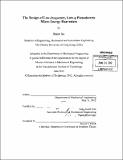The design of low-frequency, low-g piezoelectric micro energy harvesters
Author(s)
Xu, Ruize, Ph, D, Massachusetts Institute of Technology
DownloadFull printable version (10.44Mb)
Other Contributors
Massachusetts Institute of Technology. Dept. of Mechanical Engineering.
Advisor
Sang-Gook Kim.
Terms of use
Metadata
Show full item recordAbstract
A low-frequency, low-g piezoelectric MEMS energy harvester has been designed. Theoretically, this new generation energy harvester will generate electric power from ambient vibrations in the frequency range of 200~30OHz at excitation amplitude of 0.5g. Our previous energy harvester successfully resolved the gain-bandwidth dilemma and increased the bandwidth two orders of magnitude. By utilizing a doubly clamed beam resonator, the stretching strain triggered at large deflection stiffens the beam and transforms the dynamics to nonlinear regime, and increases the bandwidth. However, the high resonance frequency (1.3kHz) and the high-g acceleration requirement (4-5g) shown in the testing experiments limited the applications of this technology. To improve the performance of the current energy harvesters by lowering the operating frequency and excitation level, different designs have been generated and investigated. Moreover, a design framework has been formulated to improve the design in a systematic way with higher accuracy. Based on this design framework, parameter optimization has been carried out, and a quantitative design with enhanced performance has been proposed. Preliminary work on fabrication and testing setup has been done to prepare for the future experimental verification of the new design.
Description
Thesis (S.M.)--Massachusetts Institute of Technology, Dept. of Mechanical Engineering, 2012. Cataloged from PDF version of thesis. Includes bibliographical references (p. 107-112).
Date issued
2012Department
Massachusetts Institute of Technology. Department of Mechanical EngineeringPublisher
Massachusetts Institute of Technology
Keywords
Mechanical Engineering.